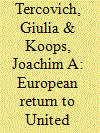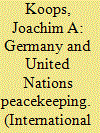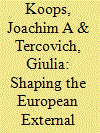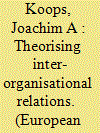|
|
|
Sort Order |
|
|
|
Items / Page
|
|
|
|
|
|
|
| Srl | Item |
| 1 |
ID:
149275


|
|
|
|
|
| Summary/Abstract |
This introductory article outlines the main rationale of the Special Issue and places the topic of the so-called ‘European Return to United Nations Peacekeeping’ in the wider context of recent policy developments and conceptual discussions related to the literature on UN troop contributions. It then outlines some of the key findings of the nine case studies (Denmark, France, Germany, Ireland, Italy, Norway, Sweden, the Netherlands and the United Kingdom) included in this issue. The article concludes that despite a recent engagement of a group of European countries in the Multidimensional Integrated Stabilization Mission in Mali (MINUSMA), expectations of a large-scale ‘return of Europe’ to UN peacekeeping are premature. While the MINUSMA experience will certainly spark important discussions and developments related to the future of UN peacekeeping and Western contributions, European countries will continue to commit only selectively troops on a case-by-case basis and only if a wide range of facilitating factors align as much as they did in the Mali case.
|
|
|
|
|
|
|
|
|
|
|
|
|
|
|
|
| 2 |
ID:
149278


|
|
|
|
|
| Summary/Abstract |
This article examines Germany’s past, present and future approach to UN peacekeeping, particularly in the context of a potential ‘European return to UN Peacekeeping’ and the country’s recent commitment to contribute to the Multidimensional Stabilization Mission in Mali (MINUSMA). By applying a conceptual framework for assessing facilitating and inhibiting factors related to Germany’s past and current participation in UN peacekeeping operation, the article argues that core reasons for German troop contributions range from bilateral partnerships and multilateral pressures, to the role of individual policy entrepreneurs and inter-organizational aspects. Yet, Germany’s culture of restraint and public scepticism towards military operations act as important inhibiting factors. Most crucially, Germany has since the early 1990s pursued an instrumentalist approach to UN peacekeeping in order to strengthen its international profile within a discourse of ‘assuming more responsibility’, to advance ‘normalization’ in security affairs and to enhance internal political and external bilateral security cooperation schemes. Germany’s recent commitment to MINUSMA and its discourse will not result in a ‘big bang’ return to UN peacekeeping, but rather to selective commitments on a carefully assessed case-by-case basis.
|
|
|
|
|
|
|
|
|
|
|
|
|
|
|
|
| 3 |
ID:
174567


|
|
|
|
|
| Summary/Abstract |
This article assesses the role, influence and core aspects of the EU High Representatives’ (HR/VPs) “political leadership” in the context of their efforts to advance the institutionalisation of the EEAS and its crisis management structures in the post-Lisbon era. By combining analytical lenses from the literature on “European political leadership”, foreign policy analysis (FPA) and political psychology with insights from a wide range of semi-structured interviews and primary sources, the article analyses how the leadership approaches of Catherine Ashton and Federica Mogherini were influenced by core aspects, such as institutional setting, situational factors and “personal qualities”. By examining how both HR/VPs and their chosen advisors sought to shape the EU’s EEAS and crisis management institutions, scholars can gain important insights about how “personal qualities” and prior foreign policy experience can influence the HR/VPs strategic choices and their impact within and across the EEAS. Finally, the article considers the differing effects between “maverick” and “orthodox” leadership and approaches and concludes that whilst outside perspectives can bring fresh ideas and institutional innovations, they will fail to be of lasting significance and permanence if not accompanied by sufficient support from the dominant foreign and security policy conventions.
|
|
|
|
|
|
|
|
|
|
|
|
|
|
|
|
| 4 |
ID:
154462


|
|
|
|
|
| Summary/Abstract |
This article explores the historical evolution of research on the “European Union (EU)–North Atlantic Treaty Organisation (NATO) relationship” since the 1950s and examines the numerous ways in which it has served as an important case study for applying and developing theory-guided and conceptual research on inter-organisational relations (IOR) in International Relations. After a dearth of policy-oriented research during the 1990s and early 2000s, a wide range of scholars have contributed to a “conceptual turn” in the study of EU–NATO during the last decade. This development, as this article will argue, not only signifies a stronger interest by scholars to understand the complex relationship between both organisations with the help of more theory-driven research, but also highlights that the EU–NATO relationship has become a “catalytic case study” in terms of inspiring conceptual experimentation and advancing efforts to theorise IOR more generally. The article provides for the first time a systematic stock-taking and analysis of the richness of concepts and theoretical debates related to EU–NATO relations research and offers scholars wider insights into the most promising approaches and analytical tools for understanding and theorising EU–NATO relations.
|
|
|
|
|
|
|
|
|
|
|
|
|
|
|
|
| 5 |
ID:
156089


|
|
|
|
|
| Summary/Abstract |
This article analyses the main challenges and future prospects of creating United Nations (UN) rapid reaction mechanisms, particularly in the light of past attempts and current discussions about a “UN Vanguard Force” in the wake of the High-Level Panel on Peace Operations report. The article reviews major initiatives (in particular lessons from the Standby High Readiness Brigade for UN Operations) and assesses the main achievements, failures, and challenges related to past UN-led rapid reaction mechanisms. In line with the overall aim of this special forum, the article highlights the future potentials and institutional, operational, financial, and political challenges that need to be overcome in order to design and create a pragmatic and effective rapid reaction tool at the disposal of the UN.
|
|
|
|
|
|
|
|
|
|
|
|
|
|
|
|
|
|
|
|
|